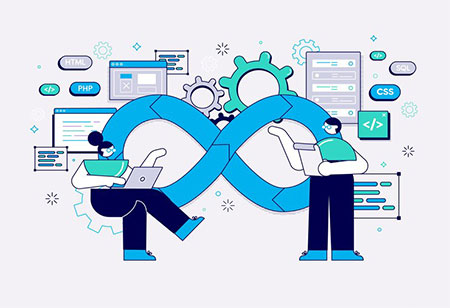
DevOps is a fusion of development and operations. DevOps has completely transformed the way companies build and deploy software. DevOps focuses on collaboration, automation, and continuous and collective improvement, allowing organizations to release high-quality software faster and more efficiently. DevOps experts are in demand, and a DevOps transition plan would mean quality work, quality pay, and opportunities to develop and deploy innovative solutions for businesses and organizations. If you're considering transitioning into DevOps, you're on the right path to staying relevant in the ever-evolving tech industry. This article provides a comprehensive guide to ease the transition and explores how to move into DevOps and the stages of transition in DevOps.
Stages of Transition in DevOps: Understanding What it All Means
Before diving into DevOps transitioning, it's essential to grasp what DevOps is all about. DevOps isn't necessarily a tool; instead, it's a system. Tech heads understand that automated and seamless systems simplify software development and make revision more accessible, even for alien developers unfamiliar with the program from the get-go. DevOps is a culture and principles that aim to break down the silos between development and operations teams. It promotes collaboration, automation, and a strong focus on delivering customer value.
Benefits of Adopting DevOps into Development Projects
Improved Code Quality: DevOps institutes systems that ensure quality codes are written within standard frames. Other benefits include a shorter development cycle and enhanced customer/client satisfaction.
Assessing Your Current Skillset
When learning how to transition into DevOps, the first step in your DevOps journey is to assess your current skill set. You must recognize your existing skills and identify areas to improve. DevOps requires technical and soft skills, including communication, collaboration, and critical problem-solving skills. Learning is fundamental to DevOps. It’s a marathon, not a sprint.
Building the Foundation
Building a solid foundation is crucial for your transition DevOps path. The foundation includes version control systems like Git and containerization and orchestration tools like Docker and Kubernetes. The aforementioned technologies are fundamental to DevOps. If you want to remain relevant in the dynamic software development market, you must understand the fundamentals and master these tech stacks.
Automation Skill
Automation is at the heart of DevOps. With automation, you can streamline repetitive tasks, reducing errors and enhancing development efficiency. You can start with scripting and coding languages like Python and Bash. These skills will empower you to automate various processes in your development and operations workflows. From Python, transition into infrastructure like Code (IaC) to manage your infrastructure.
Collaboration and Communication
DevOps encourages collaboration and communication across teams. Develop your soft skills to work effectively in cross-functional teams. You need to master communication with your team and various teams. DevOps isn't a single-person process: Collaborating seamlessly can only be achieved with excellent communication between team members. The structure and integrity of your project might fail if communication fails.
Security and Compliance
Incorporating security into DevOps is vital. Embrace the concept of DevSecOps, which integrates security into every phase of the development cycle. When developing through DevOps, you must understand compliance and regulatory requirements. You must adopt standard or best practices to protect your systems and data.
Continuous Integration and Continuous Delivery (CI/CD)
Continuous Integration and Continuous Delivery (CI/CD) involves automating your software's building, testing, and deployment. CI/CD tools like Jenkins and Travis CI can help you create pipelines that ensure your code is continuously tested and delivered from production inception to launch.
Monitoring and Feedback
Effective monitoring and feedback mechanisms are crucial to success in DevOps. Prometheus is an incredible monitoring tool that helps you gain crucial system insights. You must be able to utilize feedback to improve and make data-driven decisions continually. With DevOps, analysis, and metrics are crucial because you know what you are doing wrong while developing live would mean fewer bugs and more efficient applications. Monitoring and Feedback tools help you organize your workflow, forcing you to reconsider codes before moving to newer segments.
Conclusion
Transitioning to DevOps is a gateway to innovation and quality. DevOps is more than tools; it's a culture fostering collaboration and automation, ensuring high-quality software delivery. Evaluate your current skillset, focusing on technical and soft skills, and commit to continuous learning. Master the fundamentals such as Git, Docker, and Kubernetes. Embrace automation, enhance communication, and prioritize security and compliance. Implement CI/CD practices with tools like Jenkins and Travis CI and use monitoring tools like Prometheus for data-driven decisions. This dynamic journey into the stages of transition in DevOps ensures you remain relevant and influential in the tech industry.
We use cookies to ensure you get the best experience on our website. Read more...